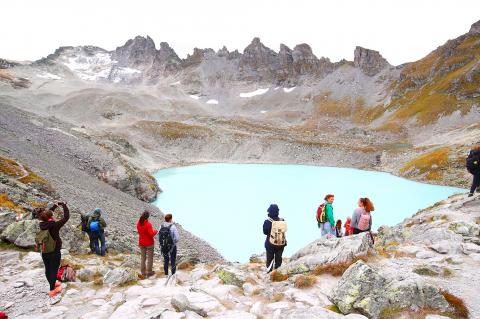Dozens of people yesterday took part in “funeral march” up a steep Swiss mountainside to mark the disappearance of an Alpine glacier amid growing global alarm over climate change.
The Pizol “has lost so much substance that from a scientific perspective it is no longer a glacier,” said Alessandra Degiacomi, of the Swiss Association for Climate Protection.
The organization said about 100 people made the two-hour “funeral march” up the side of Pizol mountian in northeastern Switzerland to the foot of the steep and rapidly melting ice formation, situated at about 2,700m near the Liechtenstein and Austrian borders.

Photo: Reuters
A chaplain and several scientists gave speeches in remembrance of the glacier, accompanied by the mournful tones of alphorns — a 3.6m pipe-shaped wooden instrument.
A wreath was laid for the Pizol glacier, which has been one of the most studied glaciers in the Alps.
The move comes after Iceland made global headlines last month with a large ceremony and the laying of a bronze plaque to commemorate Okjokull, the nation’s first glacier lost to climate change.
However, unlike Iceland, yesterday’s ceremony did not mark the first disappearance of a glacier from the Swiss Alps.
“Since 1850, we estimate that more than 500 Swiss glaciers have completely disappeared, including 50 that were named,” said Matthias Huss, a glaciologist at the ETH Zurich university.
Pizol might not be the first glacier to vanish in Switzerland, but “you could say it is the first to disappear that has been very thoroughly studied,” Huss said.
The logs kept since scientists began tracking the glacier in 1893 paint a bleak picture of recent rapid changes to the climate.
Pizol has lost 80 to 90 percent of its volume just since 2006, leaving behind just 26,000m2 of ice, or “less than four football fields,” Huss said.
Pizol, which sits at a relatively low altitude, was never very big.
According to Glacier Monitoring Switzerland, it, like nearly 80 percent of Swiss glaciers, has been considered a so-called glacieret.
It has figured among about 4,000 glaciers dotted throughout the Alps, providing seasonal water to millions and forming some of Europe’s most stunning landscapes.
Huss and other ETH scientists recently cautioned that more than 90 percent of the Alpine glaciers could disappear by the end of this century if greenhouse gas emissions are not reined in.
Regardless of what actions humans take now, the Alps will lose at least half of their ice mass by 2100, according to their study, published in April.
In a subsequent study published earlier this month, the researchers said that the Alps’ largest glacier, the Aletsch, could completely disappear over the next eight decades.

REVENGE: Trump said he had the support of the Syrian government for the strikes, which took place in response to an Islamic State attack on US soldiers last week The US launched large-scale airstrikes on more than 70 targets across Syria, the Pentagon said on Friday, fulfilling US President Donald Trump’s vow to strike back after the killing of two US soldiers. “This is not the beginning of a war — it is a declaration of vengeance,” US Secretary of Defense Pete Hegseth wrote on social media. “Today, we hunted and we killed our enemies. Lots of them. And we will continue.” The US Central Command said that fighter jets, attack helicopters and artillery targeted ISIS infrastructure and weapon sites. “All terrorists who are evil enough to attack Americans are hereby warned

The death of a former head of China’s one-child policy has been met not by tributes, but by castigation of the abandoned policy on social media this week. State media praised Peng Peiyun (彭珮雲), former head of China’s National Family Planning Commission from 1988 to 1998, as “an outstanding leader” in her work related to women and children. The reaction on Chinese social media to Peng’s death in Beijing on Sunday, just shy of her 96th birthday, was less positive. “Those children who were lost, naked, are waiting for you over there” in the afterlife, one person posted on China’s Sina Weibo platform. China’s

‘POLITICAL LOYALTY’: The move breaks with decades of precedent among US administrations, which have tended to leave career ambassadors in their posts US President Donald Trump’s administration has ordered dozens of US ambassadors to step down, people familiar with the matter said, a precedent-breaking recall that would leave embassies abroad without US Senate-confirmed leadership. The envoys, career diplomats who were almost all named to their jobs under former US president Joe Biden, were told over the phone in the past few days they needed to depart in the next few weeks, the people said. They would not be fired, but finding new roles would be a challenge given that many are far along in their careers and opportunities for senior diplomats can

Seven wild Asiatic elephants were killed and a calf was injured when a high-speed passenger train collided with a herd crossing the tracks in India’s northeastern state of Assam early yesterday, local authorities said. The train driver spotted the herd of about 100 elephants and used the emergency brakes, but the train still hit some of the animals, Indian Railways spokesman Kapinjal Kishore Sharma told reporters. Five train coaches and the engine derailed following the impact, but there were no human casualties, Sharma said. Veterinarians carried out autopsies on the dead elephants, which were to be buried later in the day. The accident site